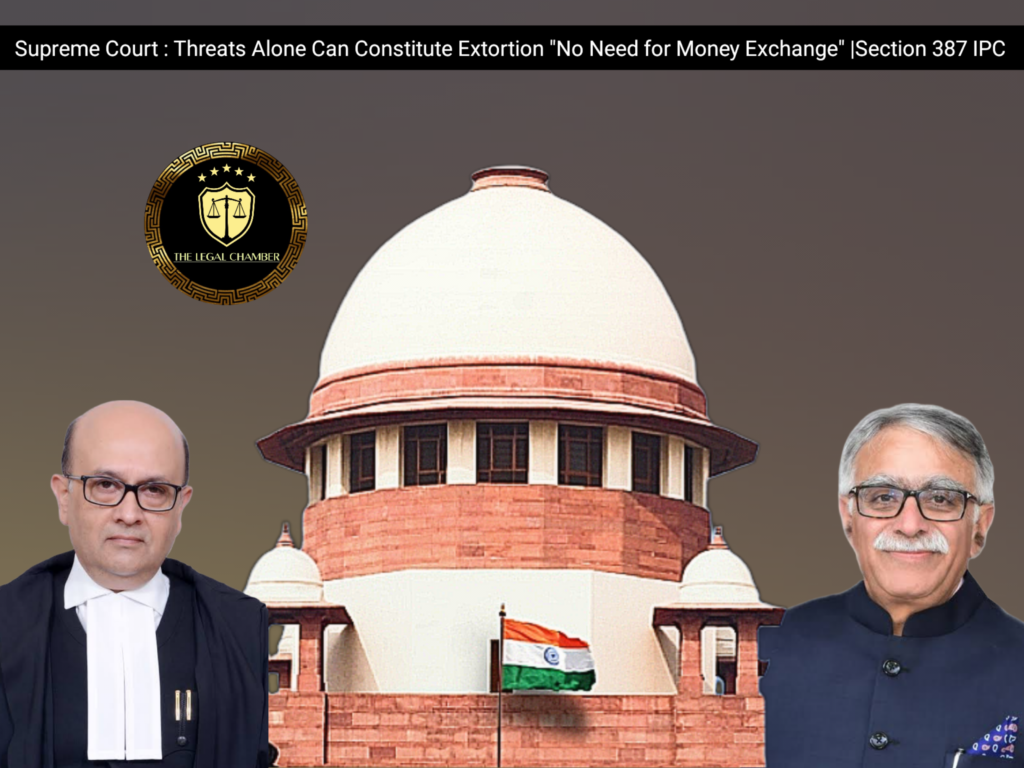
The Supreme Court of India ruled that for a prosecution under Section 387 IPC, the delivery of property is not necessary, as this section punishes the act of putting a person in fear of death or grievous hurt “in order to commit extortion,” which is a stage prior to the actual commission of extortion. The High Court’s quashing order was set aside because it wrongly emphasized the non-delivery of money, which is not an essential ingredient for an offense under Section 387 IPC.
Facts Of The Case:
The case involves an appeal filed by M/s. Balaji Traders (appellant-complainant) against a High Court judgment dated June 28, 2024, which quashed a summoning order and proceedings in Complaint Case No. 58 of 2022 under Section 387 of the Indian Penal Code, 1860. The complainant, Prof. Manoj Kumar Agrawal, proprietor of M/s. Balaji Traders, which deals in betel nut leaves, alleged that Sanjay Gupta (accused) started a similar business, leading to pending trademark and copyright litigations.On May 22, 2022, the accused, along with three armed individuals, allegedly stopped and threatened the complainant, demanding five lakhs per month to allow him to continue his business. Upon refusal, the accused reportedly assaulted and attempted to kidnap him. After the police failed to register an FIR, the complainant filed a complaint under Section 200 of the Code of Criminal Procedure, 1973. The Trial Court found a prima facie case and issued summons to the accused under Section 387 IPC. The High Court, however, quashed the proceedings, observing that an essential ingredient of extortion—delivery of property—was missing, and thus no offense under Section 383 IPC or consequently Section 387 IPC was made out.
Procedural History:
The appellant-complainant, M/s. Balaji Traders, filed an appeal against the judgment and order dated June 28, 2024, passed by the High Court of Judicature at Allahabad in Criminal Miscellaneous Application No. 19550/2024. This High Court order had quashed the summoning order dated August 28, 2023, and the entire proceedings of Complaint Case No. 58 of 2022, which was filed under Section 387 of the Indian Penal Code, 1860.The genesis of the High Court’s involvement was a complaint filed by Prof. Manoj Kumar Agrawal (proprietor of M/s. Balaji Traders) under Section 200 of the Code of Criminal Procedure, 1973, after the police allegedly failed to register a First Information Report (FIR). Pursuant to this complaint, the Trial Court, after reviewing oral and documentary evidence, found a prima facie case against the accused (Sanjay Gupta) and issued summons under Section 387 IPC. The accused, feeling aggrieved by the summoning order, then approached the High Court by filing a Miscellaneous Application under Section 482 CrPC, which led to the quashing of the proceedings. The current appeal before the Supreme Court is a challenge to this High Court’s decision.
READ ALSO :Supreme Court :No Time Bar for Railways to Recover Penalty on Misdeclared Cargo Under Section 66 of Railways Act
Court Observation:
The Supreme Court emphasized the strict interpretation of penal statutes, stating that nothing should be read into a provision that imposes penal liability and that any ambiguity should favor the accused. It highlighted that Section 387 IPC, unlike Section 384 IPC, does not require the actual delivery of property for an offense to be made out. The Court observed a clear distinction between the actual commission of extortion (Section 383 IPC) and the act of putting a person in fear in order to commit extortion (Section 387 IPC), which is a prior stage and a distinct offense.Referencing prior judgments, the Court noted that convictions under Section 387 IPC were upheld even when the money demanded was not paid or property not delivered, because the victim was put in fear of death or grievous hurt for the purpose of extortion. The Court criticized the High Court’s reasoning as “flawed and misplaced” for imposing the requirement of property delivery on Section 387 IPC, which is not prescribed by the statute. The Supreme Court concluded that the complaint prima facie disclosed the essential ingredients for prosecution under Section 387 IPC: the complainant being put in fear of death by a gun, and this act being done to pressure him into delivering money.
Final Decision & Judgement:
The Supreme Court allowed the appeal, setting aside the High Court’s impugned order dated June 28, 2024. The proceedings emanating from Complaint Case No. 58 of 2022 were restored to the file of the Trial Court. The parties have been directed to appear before the Trial Court on August 12, 2025, and are further directed to fully cooperate to expedite the hearing. Any pending applications were disposed of. The Supreme Court concluded that the instant case was not fit for quashing, as the two essential ingredients for prosecution under Section 387 IPC were prima facie disclosed in the complaint: the complainant being put in fear of death by a gun, and this action being done to pressurize him to deliver Rs. 5 lakhs. The Court emphasized that the High Court erred by stressing the non-delivery of the amount, which is not a necessary element when the accused is not charged with Section 384 IPC. The allegations of putting a person in fear of death or grievous hurt are sufficient for prosecution under Section 387 IPC.
Case Details:
Case Title: M/S. BALAJI TRADERS VERSUS THE STATE OF U.P. & ANR. Citation: 2025 INSC 806 Criminal Appeal No.:(Arising out of SLP(Crl.) No.3159/2025) Date of Judgment: June 5, 2025 Judges/Justice Name: Sanjay Karol & and Manoj Misra
Download The Judgement Here